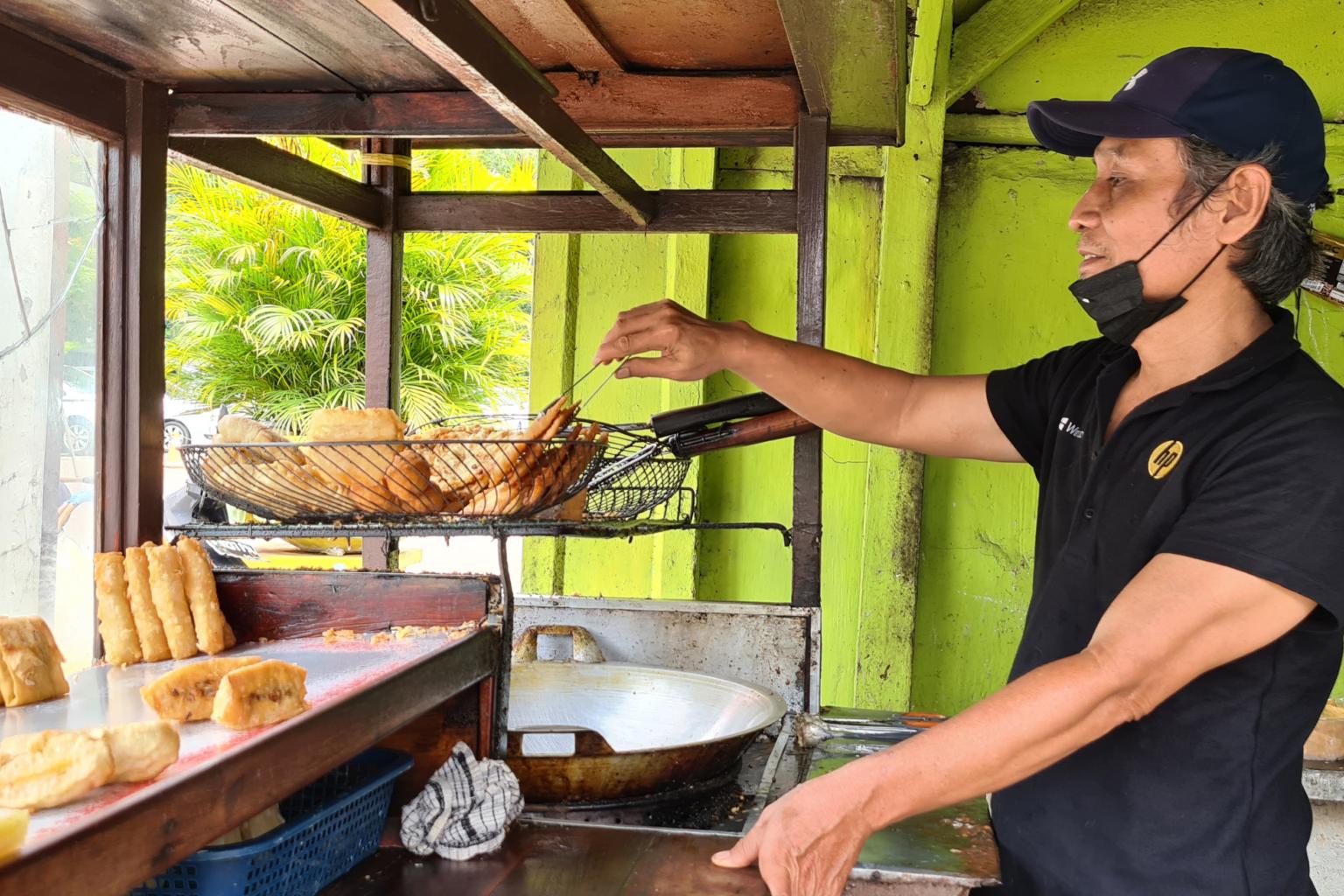'It's like gold now': Indonesian food vendors feel the pinch of cooking oil shortage
Sign up now: Get insights on Asia's fast-moving developments

Jakarta food vendor Sumarno raising the price of snacks he sells amid shortage of oil supply and higher prices.
ST PHOTO: LINDA YULISMAN
Follow topic:
JAKARTA - For a few months, Jakarta fried snack vendor Sumarno had struggled to secure cooking oil.
Sometimes he went around to convenience stores, only to find empty shelves. When lucky, he could get the oil at 20,000 rupiah (S$1.87) per litre, 43 per cent more expensive than usual.
In December, unable to bear the higher cost, he raised the price of his fried bean sprout-filled tofu, banana fritters and other snacks by 20 per cent, to 1,500 rupiah apiece.
“I can’t use less cooking oil. It really depends on how much I fry,” Mr Sumarno, who goes by one name, told The Straits Times. “It’s been very hard with the pandemic. The price of cooking oil has increased, but I’ve got fewer customers.”
While the price has started to decline over the past few weeks, the 57-year-old can buy only one 2-litre pouch of oil each time.
“Tomorrow, I will fry with today’s used cooking oil that still looks clear, adding it to new oil,” he said.
The shortage of palm oil-based cooking oil, which started in November, hit Indonesia despite it being the world’s largest producer of palm oil.
Local suppliers are exporting more palm oil amid the commodity’s surging price in the international market, as well as diverting their output to the production of biodiesel - an alternative fuel for vehicles - by combining palm oil and diesel fuel.
Introduced in 2008, the biodiesel programme seeks to cut the country’s imports of crude oil and refined petroleum and boost the domestic consumption of palm oil, thus stabilising its price. To entice palm oil producers to supply biodiesel companies, the government has provided annual subsidies, which last year totalled nearly 52 trillion rupiah.
This partly contributes to the shortage of palm-oil based cooking oil in the domestic market.
Besides food vendors like Mr Sumarno, many other micro, small and medium-sized enterprises, as well as households, have faced similar problems caused by the shortage of cooking oil at traditional markets, grocery stores and other retail outlets.

Several weeks ago, Ms Sutini, who sells cooked food in Bogor, West Java, scrapped her favourite brand of cooking oil, which she described as clear-looking and can be used for repeated frying, after its price rose to more than 20,000 rupiah per litre. Since then, she has taken any brand at a lower price.
The mother of two needs four litres of oil daily to cook 15 types of food, including empal (fried beef) and tempe (soyabean cake).
She has to get her husband and maids to help buy the oil at nearby convenience stores due to the limit of one 2-litre pouch per person.
“It’s like gold now,” she told ST. “There’s only little supply, so every time a new batch (of cooking oil) comes, it runs out very quickly.”
Ms Sutini, who goes by one name, has opted not to raise the prices of her food despite the surging prices of other commodities such as chilli.
“At least I can still make a profit, although it’s not much,” she said.
Faced with the soaring prices, the government has stepped in, from setting a one-price policy on the sale of cooking oil - at 14,000 rupiah per litre - to making it mandatory for palm oil producers to allocate one-fifth of their output for domestic consumers at fixed prices, to capping retail prices.
The latest measures, which may ease inflationary pressures caused by the oil shortage from November to January, came into force on Feb 1. But the desirable impact on consumers remains to be seen.
In observing 34 provinces recently, The Indonesian Ombudsman found panic buying by consumers, as well as hoarding of the oil. It also found that cooking oil is being diverted from modern retail outlets to traditional markets, where it is difficult to monitor its price and availability.
“Hopefully, the food stability task force can move quickly to tackle this,” said Ombudsman member Yeka Hendra Fatika. The food stability task force monitors the supply and demand as well as the price of staple food, such as rice, sugar and cooking oil, across Indonesia.
Last week, the Indonesian Consumers Foundation initiated an online petition to demand the Business Competition Supervisory Commission investigate alleged cartel practices through price fixing by four major cooking oil producers.

Ms Eet, who goes by one name, is the owner of a grocery stall at Palmerah market in Central Jakarta. She had managed to buy cooking oil from different distributors last week and this week, and sold it at the government-set prices, but supply remains limited.
“It’s still uncertain if I can get (the oil) next week,” she said.
The Trade Ministry’s director-general for domestic trade Oke Nurwan said that the prices of cooking oil have yet to stabilise as the commodity sold at government-set prices is still not being distributed evenly across Indonesia’s provinces.
“The people are advised not to go into panic buying. The government will continue to ensure the availability of cooking oil at retail price ceilings,” he said.

